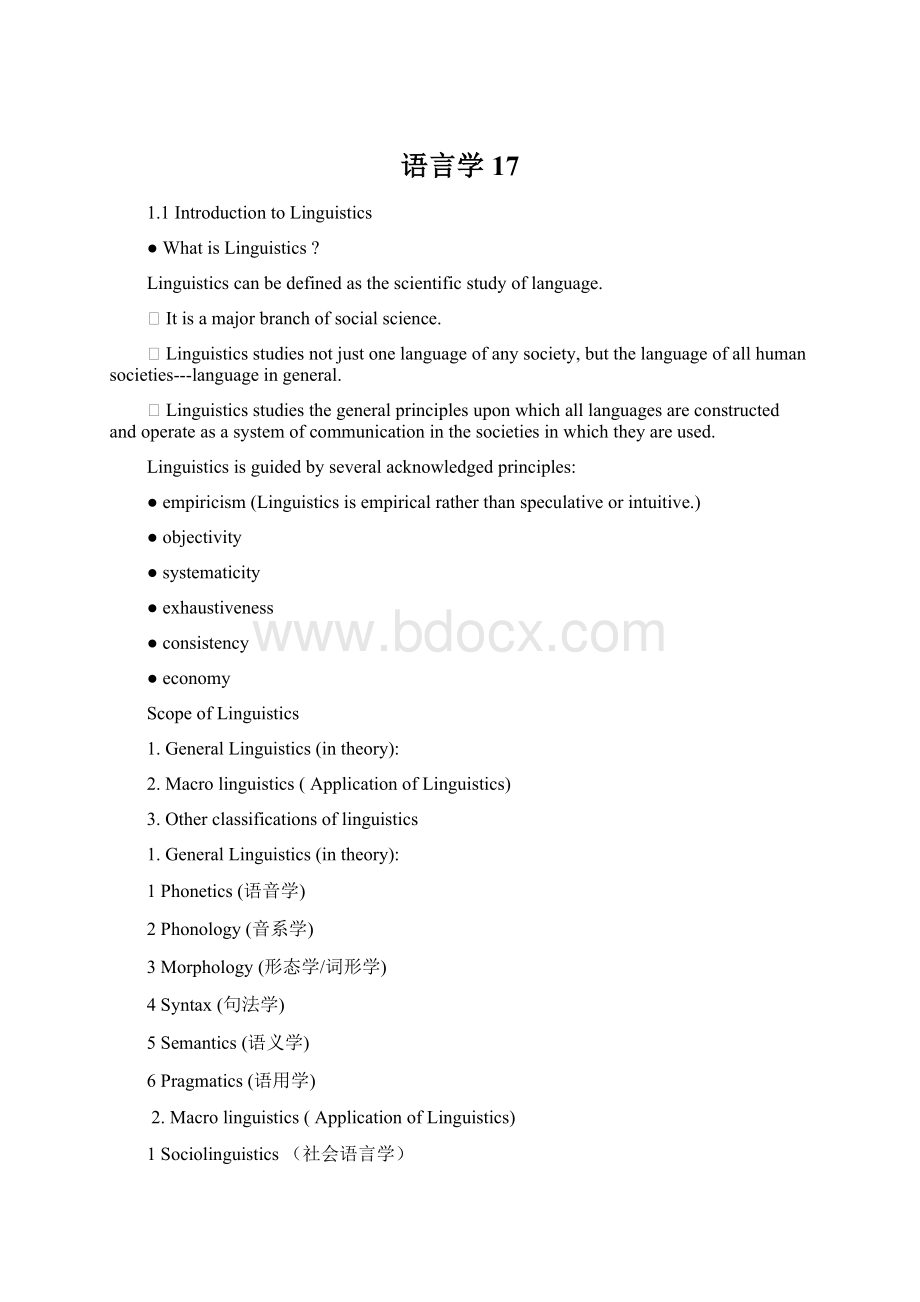语言学17.docx
《语言学17.docx》由会员分享,可在线阅读,更多相关《语言学17.docx(61页珍藏版)》请在冰豆网上搜索。

语言学17
1.1IntroductiontoLinguistics
●WhatisLinguistics?
Linguisticscanbedefinedasthescientificstudyoflanguage.
ØItisamajorbranchofsocialscience.
ØLinguisticsstudiesnotjustonelanguageofanysociety,butthelanguageofallhumansocieties---languageingeneral.
ØLinguisticsstudiesthegeneralprinciplesuponwhichalllanguagesareconstructedandoperateasasystemofcommunicationinthesocietiesinwhichtheyareused.
Linguisticsisguidedbyseveralacknowledgedprinciples:
●empiricism(Linguisticsisempiricalratherthanspeculativeorintuitive.)
●objectivity
●systematicity
●exhaustiveness
●consistency
●economy
ScopeofLinguistics
1.GeneralLinguistics(intheory):
2.Macrolinguistics(ApplicationofLinguistics)
3.Otherclassificationsoflinguistics
1.GeneralLinguistics(intheory):
1Phonetics(语音学)
2Phonology(音系学)
3Morphology(形态学/词形学)
4Syntax(句法学)
5Semantics(语义学)
6Pragmatics(语用学)
2.Macrolinguistics(ApplicationofLinguistics)
1Sociolinguistics(社会语言学)
2Psycholinguistics(心理语言学)
3Corpuslinguistics(语料库语言学)
4Computationallinguistics(计算语言学)
5Stylisticlinguistics(stylistics)(文体学/语体学)
6Appliedlinguistics(应用语言学)
7……
3.OtherClassificationsofLinguistics(linguisticschools)
1Functionallinguistics(功能语言学)
2Structurallinguistics(结构语言学)
3Chomskyanlinguistics(乔姆斯基语言学)
4Hallidayanlinguistics(韩礼德语言学)
5……
HistoryofLinguistics
5thcenturyBC,AncientGreeksbegantostudylanguage
Ancient(Plato),wordorigin&wordclassofGreek
15thcentury,universalgrammar
(Europeencounteredotherlanguageswhichforcedscholarstolookforauniversalgrammar.)
18thcentury,thesimilaritiesofsomelanguages
(1786,SirWilliamJones,thehistoricalkinshipofSanskritwithLain,GreekandtheGermaniclanguages.)
19thcentury,historicalcomparisonofdifferentlanguages
early20thcentury,modernlinguistics
(1916,F.deSaussure,CourseinGenerallinguistics)
Thehistoricaldevelopmentoflinguistics
●-Philology(语文学)(5thcenBC—18thcen)
●-Historical(comparative)linguistics(early19thcen)
●-Modern(synchronic)linguistics(1916---)
(CourseinGeneralLinguistics,Ferdinandde.Saussure)
F.deSaussure(1857-1913)索绪尔
Biography
●1857年生于瑞士日内瓦的一个学者家庭。
●1875年进入日内瓦大学,主修化学和物理。
●1876年转入德国莱比锡大学文学系,主攻历史语言学。
●1878年发表《论印欧语元音的原始系统》,轰动语言界。
●1878年赴柏林大学学习18个月。
●1880年获莱比锡大学博士学位,论文《梵语绝对属格的用法》
●1880年秋开始任教巴黎高等学院,长达10年。
成立法兰西学派。
●1891年就任日内瓦大学文学社会科学系教授。
●1907-1911年连续三次讲授普通语言学课程。
●1913年病逝于日内瓦。
●惊人的语言天赋:
●幼年就学会了法语、德语、英语、拉丁语和希腊语。
●不到15岁就写了《论诸语言》一文。
●认真的教学态度:
●曾开设日耳曼比较语法,拉丁语希腊语比较语法,立陶宛语,印欧语言比较,希腊与拉丁语音学,古代希腊碑文选读,波斯诸王碑文,欧洲地理语言学,日耳曼历史语言学,古英语,古高地德语,三次讲授普通语言学。
连续21年讲授梵文。
●严谨的治学精神:
●平生只发表过一篇论文。
●“我通常感到在语言问题上,要写上十行言之成理的文字也有困难。
”(许国璋1983:
5)
J.Culler(animportantfigureofthestructuralismmovementofliterarytheoryandcriticism.)says:
“FerdinanddeSaussureisthefatherofmodernlinguistics,themanwhoreorganizedthesystematicstudyoflanguageandlanguagesinsuchawayastomakepossibletheachievementsofthe20thcenturylinguistics.”
N.Chomsky(1928-)乔姆斯基
Chomskyisbothalinguistandasocialreformer.Heisconsideredtobetheworld’smostinfluentiallivingthinker.Heisthemost-quotedwriterinhistoryfollowingMarx,Lenin,Shakeskpeare,theBible(treatedasanauthor),Aristotle,PlatoandFreud.Theresultoftheglobalpublicintellectualspool,heldbyProspectandForeignPolicyin2005,showsthatChomskyisthefirstmostinfluentialpublicintellectualintheworld.ThisispartlyduetohisresearchonsocialaffairsandhisindependentviewsonAmericandomesticandforeignpolicies.
M.A.K.HallidayM.A.K.Halliday
●HallidaywasbornandraisedinEngland.HetookaBAHonoursdegreeinModernChineseLanguageandLiterature(Mandarin)attheUniversityofLondon.HethenlivedforthreeyearsinChina,wherehestudiedunderLuoChangpeiatPekingandunderWangLiatLingnanUniversity,beforereturningtotakeaPhDinChineseLinguisticsatCambridge.HavingtaughtChineseforanumberofyears,hechangedhisfieldofspecialisationtolinguistics,anddevelopedsystemicfunctionalgrammar,elaboratingonthefoundationslaidbyhisBritishteacherJ.R.FirthandagroupofEuropeanlinguistsoftheearly20thcentury,thePragueSchool.
1.2 Whatislanguage?
Languageisasystemofarbitraryvocalsymbolsusedforhumancommunication.
system---elementsinitarearrangedaccordingtocertainrules.Theycannotbearrangedatwill.
arbitrary---thereisnointrinsic(logic)connectionbetweenasignanditsmeaning.
vocal---theprimarymediumforalllanguagesissound,nomatterhowwelldevelopedtheirwritingsystemsare.
symbols---wordsarejustthesymbolsassociatedwithobjects,actions,ideasbyconvention.
human-specific---humanbeingshavedifferentkindsofbrainsandvocalcapacity.Onlyhumanhavelanguage.“LanguageAcquisitionDevice”(LAD)
1.3Propertiesoflanguage语言的结构特征(Designfeatures)
1)Arbitrariness(任意性)
2)Duality(双重性)
3)Productivity(创造性)
4)Culturaltransmission(文化传递性)
1.Arbitrariness---theformoflinguisticsigns(eg.words,phases)bearnonaturalrelationshiptotheirmeaning.Thelinkbetweenthemisamatterofconvention..
E.g.“house”,uchi(Japanese),mansion(French),房子(Chinese)
“Arosebyanyothernamewouldsmellassweet.”---Shakespeare
Conventionality----Inanylanguage,therearecertainsequencesofsoundsthathaveaconventionallyacceptedmeaning.Thosewordsarecustomarilyusedbyallspeakerswiththesameintendedmeaningandunderstoodbyalllistenersinthesameway.
Iconicity:
(Thereisanaturalconnectionbetweenformandmeaning.)
●-onomatopoeicwords:
rumble,crash,crackle,bang,叮咚,轰隆,咔嚓
●-compoundwords:
typewriter,washingmachine
●-phrases(proximityiconicity)
thefamousdeliciousItalianpepperonipizza
theoldblackwoodendesk
-sentences(sequencingiconicity)
Hecameinandsatdown.
Hesatdownandcamein.
Hesatdownafterhecamein.
●Icons(图形)arephysicallysimilartotheobjectsrepresented.
Eg.roadtrafficsign.
●Indexical(指示):
thereisacausalrelationbetweensignandreferent.
Eg.Smokeisindexicaloffire.
●Symbolic(象征):
servingasasymbolofsomething.
Eg.thewordinlanguage,theformulainmathematicsaresymbols.Thesesymbolsarearbitraryaswellasconventional.
2.Duality----languageisasystemwhichconsistsoftwo
setsofstructures,ortwolevels,andeachofthe
twolevelshasitsownprinciplesoforganization.
Higherlevel----unitswhicharemeaningful
Lowerlevel----soundswhicharemeaningless.Theycanbegroupedandregroupedintomeaningfulunits.
Thisisthemosteconomicalfeatureoflanguage.
●Examples:
/k/,/p/,/a:
//pa:
k/,/ka:
p//m/,/ai/,/n/,/t/,/i:
/……
Languageishierarchical:
Theadvantageofduality,whichliesinthegreatproductivepowerourlanguageisendowedwith.Alargenumberofdifferentunitscanbeformedoutofasmallnumberofelements---forinstance,tensofthousandsofwordsoutofasmallsetofsounds,around48inthecaseoftheEnglishlanguage.Andoutofthehugenumberofwords,therecanbeastronomicalnumberofpossiblesentencesandphrases,whichinturncancombinetoformunlimitednumberoftexts.
discourse/texts
sentences
words
morphemes
sounds
(PAUSEandRECALL:
Howabouttrafficlights?
)
3.Productivity(creativity)---Languageisresourceful.Itmakespossiblethe
constructionandinterpretationofnewsignalsbyitsusers.
whennewsituationsariseornewobjectshavetobedescribed,thelanguageusersmanipulatetheirlinguisticresourcestoproducenewexpressionsandnewsentences.
Sourceofproductivity/creativity
●Dualityoflanguage(结构二重性)
●Recursiveness(递归性):
Heboughtabookwhichwaswrittenbyateacherwhotaughtinaschoolwhichwasknownforitsgraduateswho…
Doworkerbeesdisplaycreativity?
●Inoneexperiment,ahiveofbeeswasplacedatthefootofaradiotowerandafoodsourceatthetop.Tenbeesweretakentothetop,shownthefoodsource,andsentofftotelltherestofthehiveabouttheirfind.Themessagewasconveyedviaabeedanceandthewholegangbuzzedofftogetthefreefood.Theyflewaroundinalldirections,butcouldn’tlocatethefood.
●AccordingtoKarlvonFrisch,whoconductedtheexperiment,“thebeeshavenowordforupintheirlanguage”.Moreover,theycannotinventone.
4.Culturaltransmission
Languageispassedonfromonegenerationtothenextthroughteachingandlearningratherthanbyinstinct.
thecaseof“thewolfchild”Genie1957年4月出生,从20个月起被关在小房子里,发出任何声音就受到父亲惩罚;大部分时间被捆在婴儿椅,或在婴儿床的睡袋里,床上罩着金属丝网14岁时被发现,基本无语言。
给予语言训练,但语法进步缓慢。
两词句,正常孩子只要几个星期,但她超过5个月使用NoMummygo这样的句式超过两年难以学会疑问句
Chimpanzeesandlanguage:
Gua,Viki,Washoe,SarahandLana
Non-humanprimatesdonothaveaphysicallystructuredvocaltractwhichissuitableforproducinghumanspeechsounds.Apesandgorillascan,likechimpanzees,communicatewithawiderangeofvocalcalls,buttheyjustcannotspeak.
Review:
1.Whatislinguistics?
2.Whatislanguage?
3.Whatarethedesignfeaturesoflanguage?
(orpropertiesoflanguage)
4.Intheory,howcanlinguisticsbeclassified?
5.Whoistheforefatherofmodernlinguistics?
6.WhatisHallidayfamousfor?
7.WhatisChomskyfamousfor?
1.4BodyLanguagesandOtherLanguages”
Qs:
1)Whatisbodylanguage?
Canyounamesomekindofbodylanguage?
2)Isitlanguage?
Whyorwhynot?
Examples:
Handtocheekthinking
TappingordrummingfingersImpatience
TiltedheadInterest
BitingnailsInsecurity,nervousness
1.5FunctionsofLanguage
AccordingtoHalliday(2003),therearethreebroadfunctionsoflanguage:
1Idea